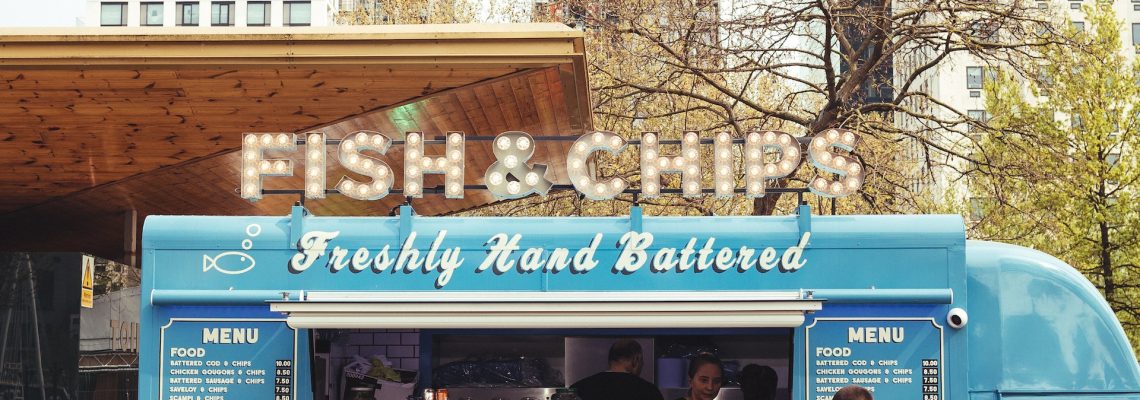Are you passionate about food and dream of running your own business? Starting a food truck business might be the perfect opportunity for you! With the growing popularity of food trucks, it’s no surprise that this industry is booming.
Owning a food truck allows you to be your own boss, have a flexible schedule, and connect with your community through delicious food. Plus, with lower startup costs compared to traditional brick-and-mortar restaurants, it’s a great way to turn your culinary dreams into a profitable reality.
But how do you make your food truck stand out in a crowded market? It all comes down to sales and marketing. By creating a strong brand and using strategic marketing tactics, you can attract hungry customers and keep them coming back for more.
Main Reasons to Start a Food Truck Business
Are you looking for a new and exciting business opportunity? Have you considered starting a food truck business? Food trucks have become increasingly popular in recent years, offering entrepreneurs a flexible and rewarding way to pursue their passion for food.
But why exactly should you consider starting a food truck business? In addition to the potential for delicious cuisine and a fun and engaging work environment, there are a number of other benefits to starting a food truck business.
In this list, we’ll explore some of the top reasons why starting a food truck business might just be the perfect venture for you.
- Lower startup costs compared to brick-and-mortar restaurants
- Flexibility in terms of location and schedule
- Ability to test out new menu items and experiment with different cuisines
- Opportunity to build a loyal customer base through personal interactions
- Potential for higher profit margins due to lower overhead costs
- Ability to participate in local events and festivals, which can lead to increased exposure and revenue
- Potential for growth and expansion by adding additional food trucks or transitioning to a brick-and-mortar restaurant in the future.
How to start a food truck business
If you love cooking and want to start a business, a food truck might be the perfect option. Here’s a guide to help you get started.
Research the market
Researching the market is a crucial step in starting a successful food truck business. Here are some specific steps you can take:
Identify your target audience
Consider the demographics and preferences of your ideal customers. Are you targeting young professionals, families, or foodies? Do they have dietary restrictions or preferences?
Research the competition
Find out what types of food trucks are already operating in your area. What types of cuisine do they offer? How do they price their menu items? This information will help you identify gaps in the market and differentiate your business from competitors.
Scout locations
Identify popular locations for food trucks in your area, such as parks, festivals, and office complexes. Consider factors such as foot traffic, parking availability, and competition.
Research regulations
Each city or town has its own regulations regarding food trucks, such as where they can operate and how they must be licensed. Research these regulations to ensure that you can operate legally and avoid any fines or penalties.
Attend local events
Attend local food truck events and festivals to observe the competition and gauge customer interest in different types of cuisine. This can also be a great networking opportunity to connect with other food truck owners and vendors.
By conducting thorough market research, you can gain a better understanding of your target audience and competition, and make informed decisions about your business strategy.
Develop a business plan
Developing a business plan is a crucial step in starting a successful food truck business. Here are some specific elements to include in your business plan:
Executive summary
Provide an overview of your business, including your goals, target audience, and unique selling proposition.
Market analysis
Conduct research on your target audience, competition, and industry trends. Use this information to identify opportunities and challenges in the market.
Menu
Develop a menu that reflects your brand and target audience. Consider factors such as cost, preparation time, and ingredient availability.
Operations
Outline the day-to-day operations of your food truck, including staffing, inventory management, and customer service.
Financial projections
Create a budget that includes startup costs, ongoing expenses, and revenue projections. Use this information to determine pricing and profitability.
Marketing strategy
Develop a marketing strategy that includes social media, advertising, and event participation. Consider ways to differentiate your food truck from competitors and attract loyal customers.
Legal requirements
Research the permits and licenses required to operate a food truck in your area. Include this information in your business plan to ensure that you are operating legally and avoiding fines or penalties.
By developing a comprehensive business plan, you can set goals, identify challenges, and create a roadmap for success. Additionally, having a solid business plan can help you secure funding from investors or lenders.
Choose a food truck
Choosing the right type of food truck is an important decision that can impact the success of your business. Here are some factors to consider when choosing a food truck:
Cuisine
Consider the type of cuisine you will be serving and the equipment you will need. Some cuisines may require more space or specialized equipment, so choose a food truck that can accommodate your menu.
Budget
Determine your budget for purchasing or leasing a food truck. The cost can vary depending on the type of truck, equipment, and modifications needed.
Permits and licenses
Research the permits and licenses required to operate a food truck in your area. Some types of food trucks may be required to meet specific regulations or have additional permits, such as health permits or parking permits.
Size
Consider the size of the food truck and how much space you will need to prepare and store food. A smaller food truck may be more affordable, but may not be able to accommodate all of your equipment and staff.
Mobility
Think about how mobile you need your food truck to be. Some food trucks are designed to be stationary, while others are designed for frequent travel.
Branding
Consider how you want to brand your food truck and how it will stand out from competitors. Some food trucks have unique designs or graphics that reflect the cuisine or culture they represent.
By considering these factors, you can choose a food truck that meets your needs and budget, and ensure that you have the necessary permits and licenses to operate legally.
Secure funding
Securing funding is an important step in starting a food truck business. Here are some options to consider:
Personal savings
If you have personal savings, this can be a good option to fund your food truck business. This will give you complete control over your finances and can save you money on interest and fees.
Loans
There are a variety of loans available to help fund your food truck business, such as small business loans, microloans, and equipment financing. These loans can be obtained from banks, credit unions, and other financial institutions. Make sure to shop around and compare rates and terms before choosing a loan.
Crowdfunding
Crowdfunding platforms, such as Kickstarter or GoFundMe, can be a good way to raise funds for your food truck business. These platforms allow you to solicit donations from friends, family, and supporters in exchange for rewards or incentives.
Investors
If you are willing to give up a portion of ownership in your food truck business, you may consider seeking out investors. These investors can provide funding in exchange for equity in your business.
When seeking funding for your food truck business, it’s important to have a solid business plan and financial projections to present to potential lenders or investors. Additionally, make sure to consider the interest rates, fees, and repayment terms of any loans or investments.
Obtain necessary permits and licenses
Obtaining the necessary permits and licenses is a critical step in starting a food truck business. Here are some permits and licenses that you may need to consider:
Business license
A business license is required to operate any type of business, including a food truck. This license is obtained from the local government where your business is located.
Health permit
A health permit is required to ensure that your food truck is operating in compliance with local health codes. This permit is obtained from the local health department and requires regular inspections to ensure that your food truck is clean and safe.
Foodservice permit
Some cities or counties require a foodservice permit in addition to the health permit. This permit ensures that you are following proper food handling and storage procedures.
Parking permits
Depending on where you plan to operate your food truck, you may need to obtain parking permits from the city or private property owner. This permit will allow you to park in designated areas during specific times.
Fire permit
Some cities or counties require a fire permit to ensure that your food truck is equipped with proper fire safety equipment and that you are following fire safety protocols.
It’s important to research the specific permits and licenses required in your area, as the requirements can vary depending on the location. Additionally, make sure to budget for any fees associated with obtaining permits and licenses, as they can add up quickly.
Design your truck
Designing your food truck is an important step in creating a visually appealing brand that will attract customers. Here are some key aspects to consider when designing your food truck:
Logo and branding
Develop a unique logo and branding that reflects your food truck’s cuisine and personality. Your logo should be easily recognizable and visible from a distance, while your branding should be consistent across all aspects of your food truck, including your menu, social media, and website.
Menu board
Your menu board should be easy to read and prominently displayed so that customers can quickly see what you have to offer. Consider using high-quality images of your food to showcase your menu items and entice customers to order.
Exterior design
The exterior design of your food truck is an opportunity to stand out and make a lasting impression on customers. Consider using bold colors, graphics, and signage to create an eye-catching design that reflects your brand.
Equipment layout
The layout of your food truck’s equipment should be designed to maximize efficiency and productivity. Make sure that your cooking equipment is easily accessible and that your workspace is well-organized and clean.
Lighting
Adequate lighting is essential for your food truck’s visibility and safety, especially if you plan to operate at night. Consider using LED lighting to highlight your logo and menu board, as well as to provide a well-lit workspace for your staff.
When designing your food truck, it’s important to consider the cost of materials and labor. You may want to hire a professional graphic designer or sign maker to create your logo and exterior design, or you can take a DIY approach and create your own designs using software and tools like Adobe Illustrator or Canva. Whatever approach you take, make sure that your food truck design is consistent with your brand and reflects the quality of your food and service.
Purchase equipment
Purchasing equipment and supplies is an essential step in starting a food truck business. Here are some key equipment and supplies that you will need to consider:
Generator
A generator is essential for powering your food truck’s equipment, especially if you plan to operate in areas without access to electricity. Choose a generator that is powerful enough to run all of your equipment and is fuel-efficient.
Refrigerator and freezer
You will need a refrigerator and freezer to store your ingredients and keep them fresh. Choose a model that is compact and energy-efficient, but also has enough storage space for your needs.
Cooking equipment
The type of cooking equipment you will need will depend on your menu. Common cooking equipment for food trucks includes griddles, fryers, ovens, and steamers. Choose equipment that is compact, durable, and easy to clean.
Serving equipment
You will need serving equipment such as plates, utensils, napkins, and cups. Choose eco-friendly options that are easy to dispose of and won’t harm the environment.
Cleaning supplies
It’s important to keep your food truck clean and sanitary, so you will need cleaning supplies such as soap, sanitizer, sponges, and towels. Make sure to stock up on enough supplies to last for several days of operation.
When purchasing equipment and supplies, consider the cost and quality of each item. You may be able to find used equipment or supplies at a lower cost, but make sure that they are still in good condition and meet safety standards. Additionally, make sure to budget for ongoing maintenance and repairs for your equipment to ensure that it remains in good working order.
Hire staff
Hiring staff is an important part of starting a food truck business, as they will help you run your operations smoothly and provide excellent customer service. Here are some key steps to consider when hiring staff:
Determine your staffing needs
Depending on the size of your food truck and menu, you may need to hire staff such as a chef, cashier, and servers. Consider the size of your food truck and the number of customers you expect to serve to determine your staffing needs.
Create job descriptions
Create job descriptions for each position you are hiring for, including the responsibilities, qualifications, and salary or hourly wage. This will help you attract the right candidates for each position.
Advertise your job openings
Advertise your job openings on job boards, social media, and local classifieds. Consider reaching out to culinary schools and training programs to find qualified candidates.
Conduct interviews
Conduct interviews with each candidate to assess their qualifications, experience, and personality. Ask relevant questions to determine if they are a good fit for your food truck and team.
Train your staff
Once you have hired your staff, provide them with the necessary training to ensure that they are familiar with your menu, equipment, and procedures. This will help them provide excellent customer service and work efficiently.
Set expectations
Set clear expectations for your staff, including work hours, dress code, and job responsibilities. Provide them with a handbook or manual outlining your policies and procedures to ensure that everyone is on the same page.
When hiring staff, make sure to comply with all employment laws and regulations, including minimum wage and overtime requirements. Additionally, consider the cost of labor when budgeting for your food truck business, as labor costs can be a significant expense.
Develop a marketing strategy
Developing a marketing strategy is a crucial step in starting a successful food truck business. Here are some key steps to consider when developing your marketing strategy:
Define your target market
Identify your ideal customers based on their age, income, location, and preferences. This will help you create marketing messages and promotions that resonate with your target audience.
Create a brand identity
Develop a unique brand identity that reflects your cuisine, values, and personality. This could include a logo, tagline, and color scheme that is consistent across all your marketing materials.
Establish an online presence
Use social media platforms like Instagram, Facebook, and Twitter to promote your food truck and engage with your followers. Share photos of your menu items, updates on your schedule, and behind-the-scenes glimpses of your food truck.
Partner with local businesses
Consider partnering with local businesses like breweries, wineries, and coffee shops to offer discounts or special promotions to their customers. This can help you reach new audiences and generate more sales.
Attend local events and festivals
Participate in local events and festivals to increase your exposure and reach new customers. This could include food festivals, farmer’s markets, and community events.
Offer loyalty programs
Encourage repeat business by offering loyalty programs, discounts, or specials to your regular customers. This can help build customer loyalty and drive sales over time.
Collect customer feedback
Solicit feedback from your customers through surveys or social media to identify areas for improvement and tailor your menu and marketing strategy accordingly.
Remember, effective marketing is an ongoing process, so make sure to regularly assess your marketing efforts and adjust your strategy as needed. By investing in a comprehensive marketing strategy, you can help ensure the success of your food truck business and build a loyal customer base.
Launch your food truck
After completing all the necessary steps, it’s finally time to launch your food truck and bring your culinary creations to the masses. Here are some tips to help ensure a successful launch:
Schedule your first events
Start booking events for your food truck, such as local festivals, farmers’ markets, and food truck roundups. Consider starting with smaller events to build your reputation and refine your operations before tackling larger events.
Invite friends and family
Invite your friends and family to your first events to help spread the word about your food truck and generate some initial buzz.
Train your staff
Make sure your staff is well-trained and prepared for the launch. This includes training on food safety, customer service, and the specific tasks they will be responsible for.
Be prepared for the unexpected
No matter how well you plan, things can go wrong during your launch. Be prepared for unexpected issues, such as equipment malfunctions, bad weather, or low turnout.
Collect customer feedback
Encourage customers to provide feedback on your menu items, service, and overall experience. Use this feedback to make adjustments and improvements as necessary.
Monitor your sales and expenses
Keep track of your sales and expenses to ensure that you’re staying on budget and meeting your financial goals.
Continue marketing
Even after your launch, it’s important to continue marketing your food truck to attract new customers and build your brand. Use social media, local publications, and other marketing channels to promote your food truck and keep your customers engaged.
Launching a food truck can be a challenging but rewarding experience. By following these tips and staying focused on your goals, you can help ensure a successful launch and set your food truck business up for long-term success.
Financial requirements needed to start a Food truck
| Category | Cost Range |
|---|---|
| Food Truck | $50,000 to $200,000 for new, less for used |
| Equipment and Supplies | $10,000 to $50,000 |
| Permits and Licenses | Varies |
| Insurance | Varies |
| Staffing | Varies |
| Marketing | Varies |
| Contingency Fund | At least 10% of total startup costs |
Food truck
The cost of a food truck can vary widely depending on the type of truck, size, and equipment. A new food truck can cost anywhere from $50,000 to $200,000, while a used truck can be purchased for less. Some food truck owners choose to convert a used vehicle, such as a school bus or RV, which can be a more affordable option.Equipment and supplies
In addition to the food truck, you’ll need to purchase equipment and supplies to operate your business, such as a generator, refrigerator, cooking equipment, utensils, and serving supplies. The cost of equipment and supplies can range from $10,000 to $50,000, depending on the size and complexity of your menu.Permits and licenses
Food trucks are subject to a variety of permits and licenses, including health permits, business licenses, and parking permits. The cost of these permits and licenses can vary depending on your location and the requirements of your local government. You may also need to pay fees for inspections and renewals.Insurance
You’ll need to purchase liability insurance to protect your business in case of accidents or lawsuits. The cost of insurance can vary depending on your coverage needs and the risks associated with your business.Staffing
Depending on the size of your food truck and menu, you may need to hire staff such as a chef, cashier, and servers. The cost of staffing will depend on the number of employees and their hourly wages.Marketing
Developing a marketing strategy to promote your food truck will require some investment, such as creating a website, designing menus and flyers, and running social media campaigns. The cost of marketing will depend on the scope and effectiveness of your marketing efforts.Contingency fund
It’s important to have a contingency fund in case unexpected expenses arise, such as repairs or equipment replacements. It’s recommended to set aside at least 10% of your total startup costs for contingencies. Overall, starting a food truck business can require an investment of anywhere from $50,000 to $200,000, depending on the size and complexity of your business. It’s important to carefully consider your finances and create a detailed budget and financial plan to ensure that you can cover all necessary expenses and set your business up for success.FAQ's
Q: Do I need a special license to operate a food truck?
Yes, food trucks are subject to a variety of permits and licenses, including health permits, business licenses, and parking permits. Make sure to research and obtain all necessary permits and licenses before opening for business.
Q: How much does it cost to start a food truck business?
The cost to start a food truck business can vary depending on a variety of factors such as the cost of the truck, equipment, permits, licenses, and supplies. A rough estimate for starting a food truck business can range from $50,000 to $200,000.
Q: How do I choose a location for my food truck?
Consider areas with high foot traffic, nearby events or festivals, and areas with limited food options. It’s also important to research and comply with local zoning laws and regulations.
Q: How do I create a menu for my food truck?
Consider your target audience, local cuisine trends, and ingredients that are easy to source and prepare in a small space. Don’t be afraid to get creative with your menu offerings and offer unique twists on classic dishes.
Q: How much staff do I need for my food truck business?
The number of staff you need will depend on the size of your food truck and menu. At a minimum, you’ll need a chef or cook and someone to handle cash transactions. Consider hiring additional staff such as servers if necessary.
Q: How can I market my food truck business?
Utilize social media platforms to share your menu, location, and upcoming events. Consider partnering with local businesses and attending local events and festivals to increase exposure. You can also offer promotions and discounts to attract new customers.
Food truck business related articles

How to Create a Unique Menu for Your Food Truck
Are you considering starting a food truck business? One of the key aspects of running a successful food truck is having a unique and enticing

Creative Marketing Strategies for Your Food Truck Business
Starting a successful food truck business requires more than just delicious food. In today’s competitive market, effective marketing strategies are crucial to attract customers, build

How Profitable are Food Truck Businesses?
The food truck industry has gained significant popularity in recent years, offering a unique and convenient dining experience for customers. If you’re considering starting a

How to Hire Employees for Your Food Truck Business?
Starting a food truck business can be a fulfilling venture, but as your business grows, you may find it necessary to hire employees to help

Legal Requirements of Food Truck Business in Australia
If you are considering starting a food truck business in Australia, it’s important to be aware of the legal requirements and regulations that apply to

